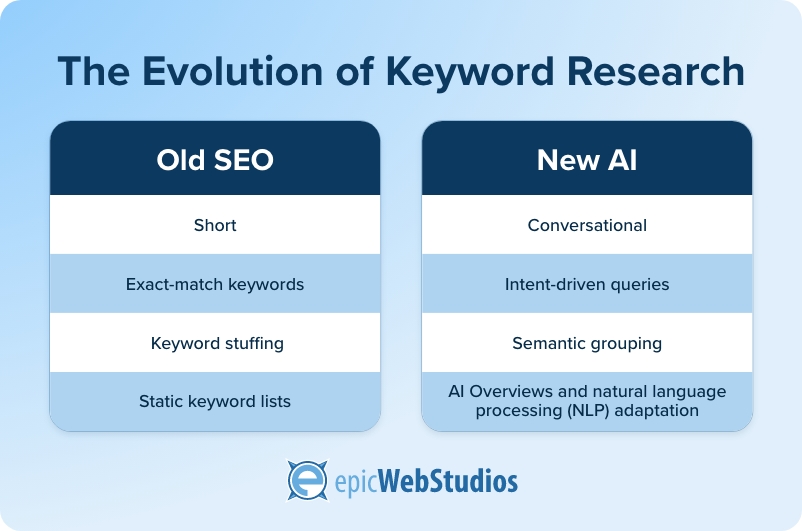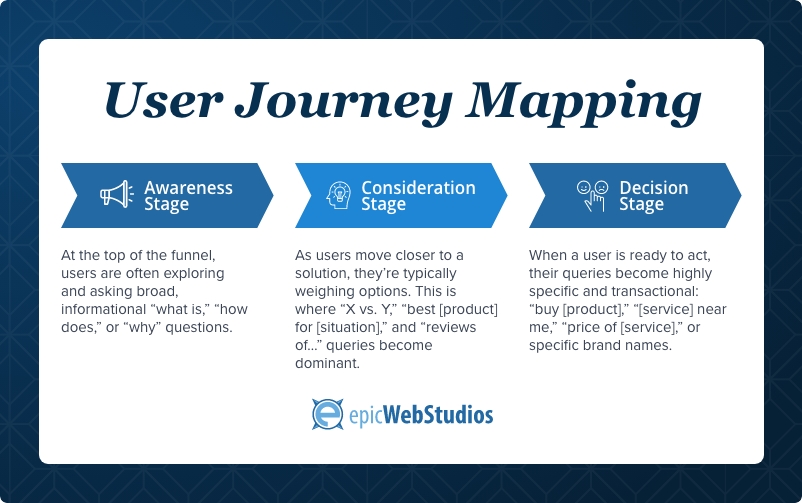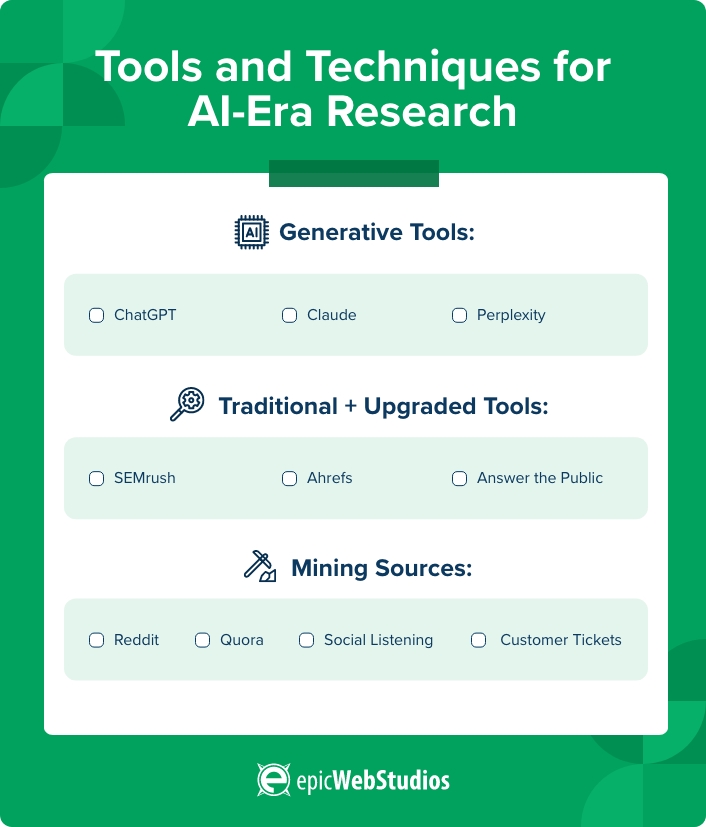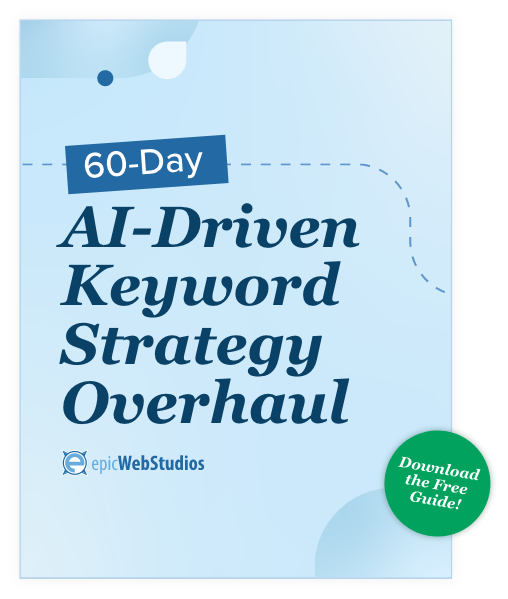Digital marketing has always lived and breathed by keywords. All along, we've meticulously researched search volumes, analyzed competition, and crafted content around precise phrases, all in the pursuit of those coveted top rankings. It was a well-understood game, with clear rules and established strategies.
But let's be honest: that era is rapidly fading, and the impact of AI on keyword research is officially scrapping those rules. We're witnessing nothing less than the death of keywords as we knew them, and simultaneously, the rebirth of a smarter, more intuitive approach to understanding search intent.
The new reality? Contextual search AI interprets not just what users type, but why.
How AI Has Transformed Search Behavior

Thanks to advancements in AI, search behavior has undergone quite a transformation in a very short time.
From Keywords to Conversations
At the heart of this shift is the ability of AI to understand language in a way that mimics human comprehension. Users are now searching like they speak, asking questions in full sentences, and expecting intelligent, relevant answers.
Natural Language Processing (NLP)
AI's mastery of NLP means search engines can interpret the nuances, synonyms, and implied meanings within a user's query. This allows for a far more intuitive search experience, where users can express their needs naturally, rather than trying to guess the "right" keywords.
Instead of typing "best running shoes 2025," a user might now ask, "What's the best running shoe for high arches that's good for trail running?" The difference is night and day, signaling a much deeper, more specific intent.
AI can also now "remember" previous queries within a session, allowing users to ask follow-up questions without repeating context. For instance, "And what about options under $150?" seamlessly continues the previous search for running shoes.
Voice Search
Mobile devices and smart speakers (like Alexa and Google Assistant) have supercharged this conversational trend. Speaking queries naturally is often more convenient than typing, leading to longer, more question-based searches.
Semantic Search
Semantic search, powered by AI, doesn't just look for keyword matches; it interprets the relationships between words, entities (people, places, things), and concepts. This allows it to deliver results that are truly relevant to the user's underlying meaning, even if the exact words aren't present.
User Intent
A single query can now carry multiple layers of intent. AI will dissect these complex queries to understand if the user is looking for information, trying to buy something, or navigating to a specific website, and then prioritize results accordingly.
Query Personalization
AI algorithms are constantly learning from individual user behavior. As such, search results are increasingly personalized based on past searches, browsing history, location, and even implied preferences, creating a unique search experience for everyone.
Contextual Search
The "where," "when," and "how" of a search are now key contextual signals. AI considers a user's current location for local searches, the time of day, and the device they're using (i.e., mobile vs. desktop) to deliver the most appropriate results.
Ultra-specific Queries
7+ word searches are becoming normal. As users become more comfortable with conversational search, they're increasingly using longer, more detailed phrases. This means instead of "pizza," they might search for "best thin-crust pizza delivery near me open late."
Comparison Queries
Users are actively seeking detailed comparisons and recommendations. Queries like "iPhone 16 vs. Samsung Galaxy S25 camera quality" or "best CRM for small businesses with under 10 employees" are prime examples of this growing trend.
Problem-Solution Matching
As before, when users encounter a problem, they turn to search for solutions. Queries starting with "how to fix," "how to solve," or "how to resolve" highlight a clear need, presenting a golden opportunity for content that offers practical, actionable advice.
The Impact of AI on Keyword Research Methodology
When considering the impact of AI on keyword research, it's clear that traditional approaches are no longer enough. A dynamic AI-first approach must prioritize understanding the user, their journey, and the context of their queries.
Intent-First Research Framework
The core of your new methodology must be intent. Forget starting with keywords; start with the user. What are they trying to achieve? What problem are they trying to solve?
User Journey Mapping

Understanding the distinct phases of a user's journey is paramount. Their query patterns change dramatically from initial awareness to final decision, and the research must reflect this.
Pain Point Discovery
Don't just rely on search data! Dive into where your audience actively discusses their frustrations and questions. Forums, Reddit, social media comments, and even your own customer support tickets are goldmines for uncovering real-world pain points.
Once you understand the pain, develop content and optimize for queries that seek solutions. "How to fix [common issue]," "troubleshooting [problem]," or "best ways to overcome [challenge]" are excellent starting points.
Objection-handling Search Patterns
What are the common reservations or questions users have before committing? Research queries like "is [product] worth it," "[service] disadvantages," or "alternatives to [competitor]" to proactively address concerns.
Follow-up Queries
Think multi-turn. If someone asks "best laptops for students," what's their likely next question? "Affordable laptops for engineering students?" or "MacBook Air vs. Dell XPS for college?" Anticipating these follow-ups helps build comprehensive content experiences.
Semantic Keyword Research and Grouping
Instead of just grouping exact matches, AI encourages grouping semantically related concepts. For example, "content marketing strategy," "content promotion ideas," and "content repurposing" are all part of a broader "content marketing" topic.
Entity-based Research
AI thinks in terms of entities. Research not just keywords, but the core entities relevant to your niche: specific products, influential people, key locations, or abstract concepts. How do these entities relate to your audience's needs?
Content Gap Identification
By mapping out existing content and relevant topics, you can pinpoint where your content falls short. Are there key questions your audience is asking that you haven't addressed? Are there subtopics within a broader theme that you've overlooked?
AI Citation Analysis
It's not only about what keywords your competitors rank for, but when and how they are referenced by AI systems. Are they cited as authoritative sources in generative AI responses? Are they appearing in "people also ask" boxes for broad queries?
Content Depth Assessment
AI rewards comprehensive, in-depth content that truly answers a user's query. Your competitive analysis should shift from keyword density checks to evaluating the authority of your competitors' content on specific topics. Are they covering every facet of a subject, or just scratching the surface?
Tools and Techniques for AI-Era Research

To fully grasp the impact of AI on keyword research, marketers need to leverage new AI-powered tools and platforms.
Upgraded Keyword Tools
- Google Keyword Planner: While often seen as a basic tool, GKP is increasingly leveraging Google's understanding of search to provide more semantically related and intent-driven keyword suggestions.
- SEMrush and Ahrefs: These industry giants have integrated AI to offer "related keywords," "question-based keywords," and "topic clusters" that go beyond simple volume data.
- Answer The Public: It visually represents common questions and conversational phrases users are asking around a topic, making it easy to spot intent-driven opportunities.
Generative AI Keyword Research Tools
- ChatGPT and Claude: Large Language Models (LLMs) like ChatGPT and Claude are incredible for generating natural language variations of topics, brainstorming long-tail questions, identifying user personas, and even simulating conversational search scenarios to uncover query patterns.
- Perplexity AI: Perplexity AI excels as an "answer engine," summarizing information from various sources and providing citations. This makes it invaluable for quickly understanding complex topics and discovering the core questions users are asking, often with direct answers that mimic AI Overviews.
- Google's "People Also Ask": Directly analyzing the "People Also Ask" (PAA) boxes in Google's Search Engine Results Pages (SERPs) is a manual but highly effective technique. These questions represent what Google's AI determines are closely related and common follow-up queries, providing direct insights into user intent or content gaps.
Conversation Mining Platforms
- Reddit and Quora: Specialized opinion mining tools (or even manual exploration) of platforms like Reddit and Quora can reveal raw, unfiltered questions, pain points, or specific terminology used by real people.
- Social Listening: Monitoring social media conversations allows you to identify common natural language users employ when discussing products, services, or problems relevant to your niche.
- Customer Support Tickets: Your customer support logs are worth more than you think! Analyzing common issues customers use to describe their problems provides direct, high-intent insights for content creation.
Measuring the Impact of AI on Keyword Research
Relying solely on traditional metrics like overall organic traffic or broad keyword rankings provides an incomplete (if not misleading) picture in the age of AI. Moving forward, brands need to focus on metrics that truly reflect user intent, conversational engagement, and how our content is perceived and leveraged by advanced AI systems.
That being said, several critical new Key Performance Indicators (KPIs) demand attention, namely:
- Conversation Completion Rates: It's time to analyze user journeys that involve multiple conversational queries. Are users finding complete answers on your site that satisfy their initial question and subsequent follow-ups?
- AI Citation Mentions: This is an emerging, profoundly important metric. How often is your brand, website, or specific pieces of content directly referenced or summarized by AI Overviews?
- Long-Tail Traffic Growth: The explosion of conversational search means a greater emphasis on longer, more specific queries. As such, marketers should closely track the growth and performance of organic traffic derived from queries consisting of four or more words.
- Search Volume Interpretation: Raw search volume for broad keywords becomes less important. Try to focus on the quality of volume for highly specific, intent-driven queries. A lower-volume query that perfectly matches user intent is far more valuable than a high-volume, vague term.
- Click-Through Rate (CTR) Analysis: Analyze CTR not just generally, but specifically for pages optimized for conversational snippets (like FAQs). Are the snippets generated from your content compelling enough to earn the click, even if an AI Overview is present?
- Conversion Attribution: The customer journey is rarely linear. With AI's ability to synthesize information from various sources, conversion attribution models must now account for multi-touchpoints across content types. Understanding the sequence of queries that lead to a conversion provides richer insights into the user's decision-making process.
- Topic Authority Assessment: Assess your competitors' topic authority. How comprehensively are they covering a particular subject? Are they becoming the go-to resource for clusters of related queries, signaling to AI that they are an expert source?
Industry-Specific Applications: Tailoring AI-Era SEO for Your Niche
The principles of AI-driven keyword research are universal, but their implementation requires a nuanced understanding of specific industry dynamics. What works for a local bakery will differ significantly from a global SaaS company.
Local Business
For local businesses, the AI shift intensifies the need for hyper-local and highly conversational optimization. Proximity, real-time availability, and direct answers are key!
Conversational Local Queries
The simple "near me" search has evolved. Users are now asking, "Where's the best [type of restaurant] that's open now and has outdoor seating?" Local businesses can optimize for these detailed conversational queries by providing comprehensive, up-to-date information on their Google Business Profile and local landing pages.
Voice Search for Local
Voice search heavily favors local intent on mobile devices and smart speakers. Optimizing for questions like "Find a plumber near me who offers emergency service" or "What's the closest coffee shop?" requires anticipating natural language and making sure your local listings provide direct, concise answers.
Review and Recommendation Queries
Users frequently ask AI for recommendations (i.e., "What's the best pizza place in [city]?"). As a result, positive online reviews and strong social proof are crucial.
Local businesses must actively manage their online reputation, encourage reviews, and integrate testimonials into their site content to influence the AI's recommendations.
E-commerce
For e-commerce, AI is transforming how consumers discover, compare, and ultimately purchase products. The focus shifts from merely listing products to supporting the entire buyer's journey through content.
Product Research Conversations
Shoppers aren't just searching for product names; they're researching solutions. Think along the lines of "best laptop for graphic design students" or "best non-toxic cleaner for pet owners."
This means creating detailed buyer guides, comparison articles, and comprehensive product descriptions that address nuanced user needs.
Comparison Shopping Queries
As users move down the funnel, they engage in a detailed comparison. Queries like "[Product A] vs. [Product B]" or "features of [product] for [specific use]" are common here.
E-commerce sites can react by providing comparison content, feature breakdowns, and detailed specifications to satisfy these highly specific information needs.
B2B and Professional Services
In B2B sectors, AI-driven search emphasizes problem-solving, industry expertise, and thought leadership.
Solution-Focused Queries
B2B buyers and professional service clients often begin their search with a specific business problem. Optimize for queries like "how to improve [business process]," "solutions for [industry challenge]," or "reduce [operational cost]." Your content should position your services as the clear answer to these pain points.
Industry-Specific Conversations
Demonstrate your expertise by creating comprehensive content around highly technical terms, industry-specific jargon (explained clearly), and niche topics that your target audience discusses within their professional sphere.
Thought Leadership Positioning
Create content that answers complex, strategic questions ("What are the long-term implications of AI on [industry]?"). Participating in industry forums, conducting original research, and contributing to high-authority publications can also signal expertise to AI, influencing its perception of your brand as an authoritative source.
Implementation Roadmap: Your 60-Day Keyword Research Overhaul

This 60-day roadmap provides a structured approach to integrating these new methodologies into your existing digital marketing efforts.
Ready to Win the Keyword Revolution?
At Epic Web Studios, we build Generative Engine Optimization (GEO) strategies that put you ahead of the curve, driving real results in a world where search is smarter than ever.
Contact our team today to take the next step for tomorrow!


